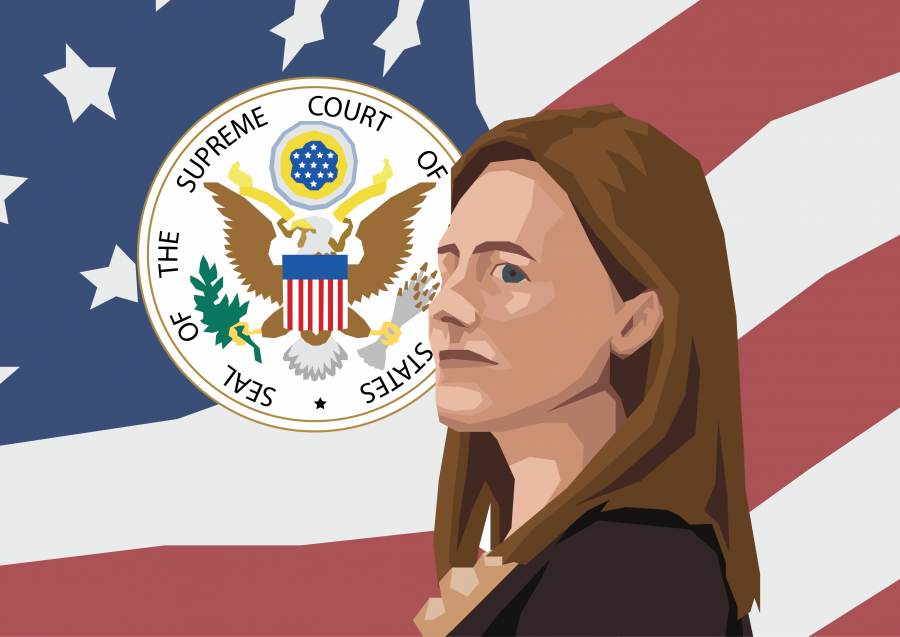Art by Palina Kuzmina
“She doesn’t deserve to be the fifth woman on the Supreme Court” says Palo Alto High School sophomore Maya Mukherjee of the recent confirmation of Justice Amy Coney Barrett.
Although Barrett refused to answer questions about healthcare, climate change, and abortion during her confirmation hearings, her past writings as a circuit court judge and professor at Notre Dame Law School have raised concerns for many in the largely liberal Paly community.
Healthcare
In the past, Barrett has been openly critical of the Affordable Care Act, the landmark healthcare legislation signed into law in 2010 by President Barack Obama. On Nov. 10, the Supreme Court will hear a case challenging the constitutionality of the individual mandate, a core part of the law that requires all Americans to have health insurance or pay a fine. Eliminating the individual mandate would effectively destroy the ACA.
Palo Alto High School History and Economics teacher Eric Bloom described the likely consequences of eliminating the ACA.
“There’s going to be a bunch of people who will lose their insurance or lose their parent’s insurance, which means they’ll have to get their own or get it through work, which again, will put more burdens on jobs,” Bloom said.
Two million young adults have benefited from the key provision in the ACA that allows young adults to remain on their parent’s health insurance until age 26, so, depending on what the ruling in the case is, the result could directly affect current Paly students going to college in a few years.
And then there are other people who could lose access to medical care.
“Abolishing the Affordable Care Act would hurt so many young people who don’t have the means to purchase private health insurance,” Paly junior Phoebe Berghout said. “I really think that there’s [going to be] a point in my life where I might depend on public health insurance and the ACA.”
“Abolishing the Affordable Care Act would hurt so many young people who don’t have the means to purchase private health insurance,” “I really think that there’s [going to be] a point in my life where I might depend on public health insurance and the ACA.”
-Paly junior Phoebe Berghout
Mukherjee shares these concerns.
“College is already super expensive and it would be hard for college students to have to pay for health insurance on top of everything else,” Mukherjee said.
Climate Change
In addition to healthcare, Barrett’s views on climate change have raised concerns among Paly students. During her confirmation, in response to a question about her views on climate change, Barrett said, “I have read things. I’m not a scientist. I would not say I have firm views on it.”
To Berghout, Barrett’s answer is frustrating and shows her lack of insight into the enormous issue that will face generations to come.
“For her to say that in her hearing only foreshadows the fact that she will be ignorant in the future,” Berghout said.
Mukherjee expressed concerns about how a conservative majority on the Supreme Court, cemented by Barrett’s confirmation, could impact efforts to address climate change.
“[Although] she didn’t really answer the question, she is pretty conservative,” Mukherjee said. “If six people on the Supreme Court think that it [climate change] is not a huge deal, that is definitely a problem.”
Abortion
The issue of abortion has perhaps been most controversial for Barrett. She has expressed anto-abortion views in the past, signing her name on an advertisement that called for the landmark abortion law Roe v. Wade to be overturned.
Berghout expressed dismay with Barrett’s pro-life views.
“It’s frustrating to be told that the government doesn’t think you should have control over your own body,” Berghout said.
Mukherjee also worried about Barrett’s impact on women’s rights.
“Ruth Bader Ginsburg made a lot of progress for women; she [ACB] will undo all of it,” Mukherjee said.
“Ruth Bader Ginsberg made a lot of progress for women; she [ACB] will undo all of it.”
-Paly sophomore Maya Mukherjee
Bloom was also concerned about the speed and timing of Barrett’s confirmation.
“The idea of having a nominee run through so quickly: I think it’s disingenuous to the interests of the nation,” Bloom said. “And to have a Supreme Court nominee confirmed so close to a national election: I think it’s reckless.”
